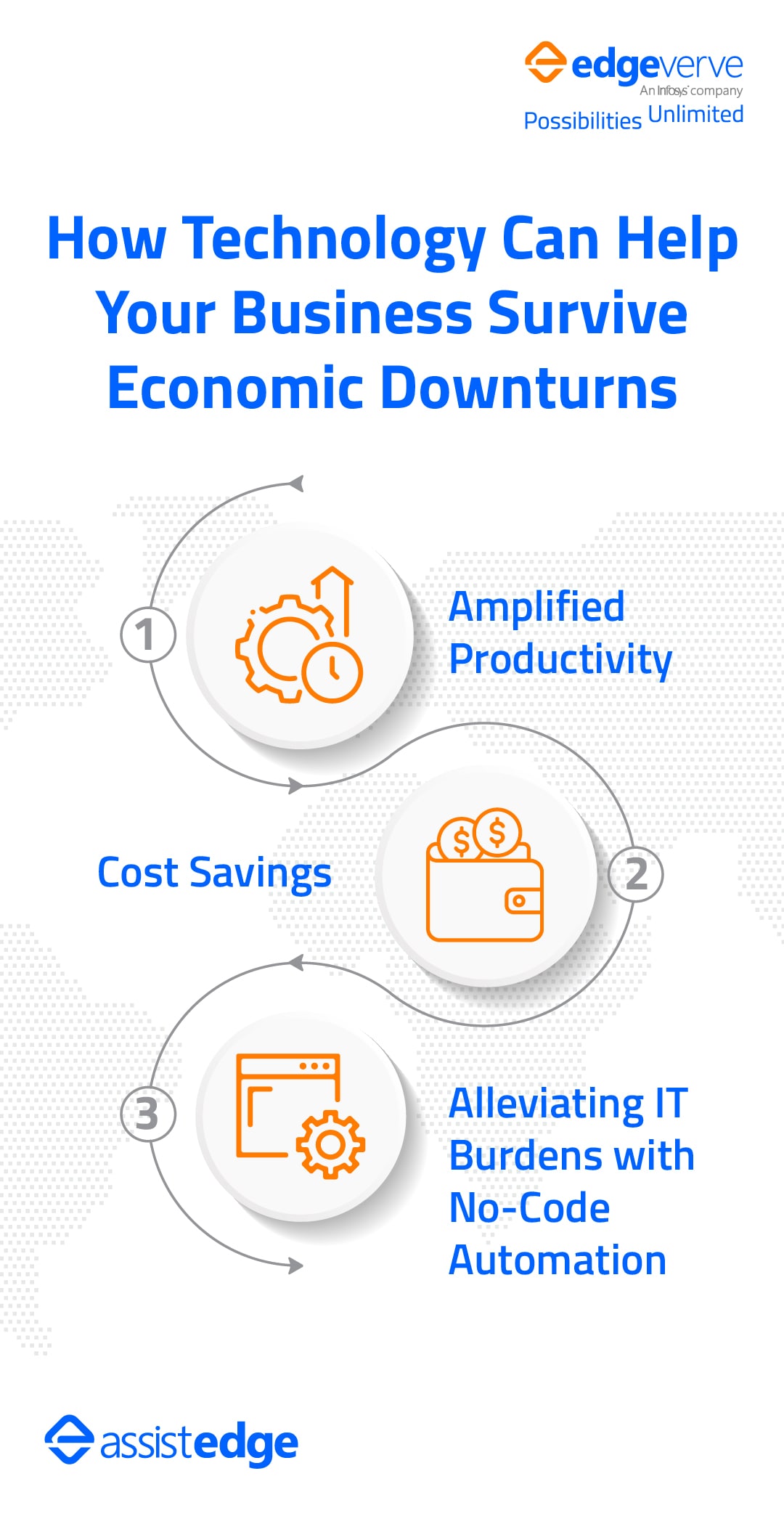Home > AssistEdge > Blogs > From Crisis to Opportunity: How Automation Drives Business Resilience
From Crisis to Opportunity: How Automation Drives Business Resilience

Table of Contents
Fortifying our organization or business may seem deceptively simple in the face of a recession. However, let us not underestimate the formidable challenges that lie before us. Presently, we find ourselves grappling with an unparalleled convergence of talent scarcity, soaring inflation rates, and unsettling fluctuations within the supply chain, exerting immense pressure on leaders across the globe.
Should we fail to act swiftly and decisively, the repercussions of these economic tremors will undoubtedly wreak havoc on our endeavours. Hence, it becomes imperative for us to adopt a proactive stance, honing in on immediate strategic opportunities that hold the potential to amplify the value we provide.
Picture this: You are aboard a rollercoaster, bracing for the tumultuous twists and turns ahead. Navigating those bumpy tracks with finesse is the key to conquering this thrilling ride. Similarly, our leadership demands informed decision-making and thoughtful reflection in the current economic climate. We must carefully weigh the immediate repercussions while keeping our long-term objectives in sight. We must invest in the right solutions to confront the challenges in these uncertain times. Automation technology catalyses lightening the burden on employees, replacing inefficient processes with streamlined ones, and achieving remarkable outcomes with minimal resources. To embark on this transformative journey, it is crucial that we first grasp the nuances of our current circumstances.
Is Your Organization Equipped to Navigate Recession?
To answer this, we need to delve further into the intricate tapestry of recession and its underlying dynamics. A potent blend of Russian sanctions resulting from the Ukraine conflict, the pandemic’s far-reaching consequences, and many environmental factors have contributed to unsettling market volatility and economic uncertainty. Amidst these complexities, it is worth noting a silver lining: the recession-driven by inflation tends to have a softer impact on organizations. For the most part, corporate earnings remain relatively unscathed, and foundational industries such as automotive and housing continue to display robustness.
Regardless of its nature, we must acknowledge that a recession remains a recession. Sluggish economic activity inevitably leads to diminished sales, shrinking profit margins, and potential wage reductions. Hiring freezes and layoffs become unavoidable, underscoring the urgency we must fortify our organizations. The path to resilience lies in establishing digitized and automated business processes, fostering adaptability that minimizes the impact of crises and enables us to seize opportunities and thrive amidst adversity.
The Power of Automation: A Recession’s Secret Weapon
Amidst the ever-evolving business landscape, one trend stands out prominently: the rise of AI and Robotic Process Automation (RPA). These cutting-edge technologies have taken the world by storm, particularly in the post-Covid-19 era, where contactless customer experiences have become the norm. The strategic adoption of AI, automation, and cloud solutions is paramount in bolstering business resilience, streamlining operational processes, and paving the way for sustainable growth. McKinsey’s research underscores the significance of a strong business resilience strategy, revealing that the top 20% of companies that successfully weathered the disruption and recession caused by the Covid-19 pandemic had robust resilience measures.1
Let us explore some industry-specific examples of how automation can enhance business resilience:
Automation in the financial services sector can streamline tasks, such as insurance renewals, pension administration, and policy management. By embracing automation, organizations in these fields can achieve heightened operational efficiency, elevate customer experiences, and establish a solid foundation for navigating the undulating tides of the business landscape.
Let’s take a closer look at how automation has empowered specific industries to enhance their business resilience. For example, automation has revolutionized tasks like insurance renewals, pension administration, and policy management in the financial services sector. By embracing automation, organizations in this field have witnessed remarkable improvements in operational efficiency, elevated customer experiences, and established a strong foundation to navigate the ever-changing business landscape.
So, how precisely can automation and digitization help us weather the storm? The answer lies in their ability to recession-proof our businesses, offering many benefits. Here are just a few:

Embracing the Synergy of Human and Digital Collaboration
Remarkable transformations can be achieved by harmonizing human expertise and digital capabilities. With comprehensive data insights, automated scripts can be deployed to reduce manual processes, accelerating work streams while elevating precision and dependability. The realms of Robotic Process Automation (RPA), Artificial Intelligence (AI), and Machine Learning (ML) have already reached advanced stages, and it is imperative that we wholeheartedly embrace these technologies. The constraints that emerged during the pandemic have vividly illustrated the boundless potential of “bots” in performing myriad tasks, including price quotes, book closure, payment collection, customer interactions, and other repetitive endeavours. Let us remember that our objective is not to replace humans but to leverage data strategically, enabling us to unlock its utmost value.
Conclusion: Navigating the Economic Downturn
In the current economic downturn, a few well-placed actions can enable us to maintain our focus on delivering results that augment value while optimizing costs. Undoubtedly, recessions can be overwhelming; however, we can significantly mitigate the impact by promptly assessing the climate and responding with agility. Though turbulent waters may lie ahead, solutions like AssistEdge from EdgeVerve stand ready to safeguard and buoy your business. Assessing your organization’s resilience and gauging its ability to adapt in the face of a crisis is crucial. How can you recession-proof your organization? While automation undeniably yields exceptional outcomes, it is essential for businesses to holistically evaluate all aspects and take comprehensive action not just to survive but thrive in any situation.
References:


Sateesh Seetharamiah
CEO, Edge Platforms, EdgeVerve
More blogs from Sateesh >